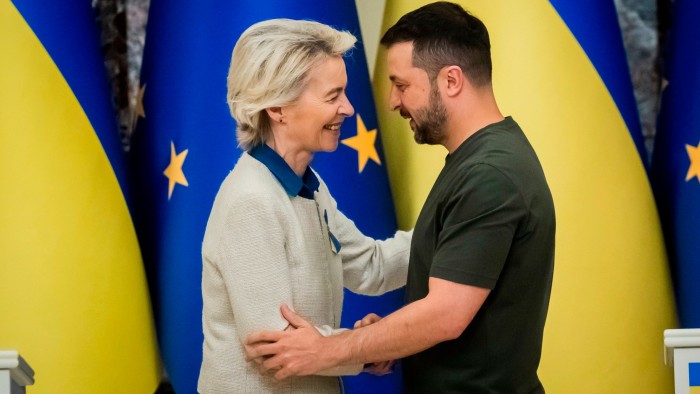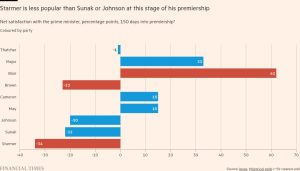We need a more agile EU sanctions regime to counter the Kremlin

Stay informed with free updates
Simply sign up to the Russian politics myFT Digest — delivered directly to your inbox.
The writer is the commissioner for sanctions policy and adviser to the office of the president of Ukraine
Last month, we passed 1,000 days of violence against Ukraine. Since the beginning of Russia’s full-scale invasion, the EU has given considerable military and economic assistance to Kyiv. It has also built a centralised sanctions regime against Moscow — targeting sectors, businesses and individuals with asset freezes and trade measures — albeit with a somewhat myopic focus on “the next big package”.
Sceptics claim that this regime has failed to contain the Russian war effort as the Kremlin adapts quickly to our efforts to restrict its actions. Yet even though Russia continues its aggression against Ukraine, sanctions do indeed have an impact and restrain the Kremlin’s ability to wage war. Since 2022, EU exports to Russia have declined by 58 per cent and imports from Russia by 86 per cent. The country’s trade costs have significantly increased. The surge in interest rates to 21 per cent in October, and the recent tumble of the rouble against the dollar, show the strain below the surface.
And yet, through determination and quick action, the Russian war machine grinds on, adapting to the measures Brussels puts in place. Since the summer, Russian forces have been capturing Ukrainian territory at a faster pace than at any time since 2022.
Time is of the essence: the EU needs to manoeuvre more swiftly. Recently, it adopted a new framework to target individuals and entities behind hybrid attacks by Russia that undermine the EU’s security, independence and integrity. This falls on top of numerous existing frameworks. Nonetheless, it is estimated that up to $3bn in officially prohibited western exports finds its way to Russia every month. The excuse that “we don’t know how critical components keep getting through” cannot stand any longer. We must quickly and continuously identify and list offending entities.
While a 15th sanctions package is imminent, the last time Brussels imposed new penalties was over four months ago. By way of comparison, the UK announced 56 new sanctions against the Russian military-industrial complex last month, crippling the supply of military equipment, along with sanctioning Russian-backed mercenary groups. The US also imposed new sanctions, targeting 118 individuals and entities in Russia’s financial services sector. This is on top of the nearly 400 listings made on October 30. Both countries regularly update their listings to match Moscow’s attempts to circumvent them — allowing them to renew pressure just as the Kremlin tries to adapt.
The US has also sanctioned entities in third countries to a greater extent than the EU, effectively preventing such agents from aiding Russia to overcome trade restrictions. While Europe is cautious about protecting business interests and “not crossing any red lines”, Chinese trade delegations assess Russian goods and enterprises for purchase. Institutions and companies, inside and outside Europe, that facilitate financial flows and trade with Russia must be subject to EU measures as soon as their involvement becomes known.
The global shipping market has shown vulnerability to misuse, and this must be systematically addressed, starting with fast and effective sanctioning and enforcement on the tankers that make up Russia’s shadow fleet. This navy of at least 600 tankers undermines the impact of sanctions on Russia’s state budget. In August 2024 alone, this shadow fleet accounted for 90 per cent of Russia’s seaborn crude oil shipments.
The rules-based international order is at risk: the principles of national sovereignty and fundamental human rights are under attack. While the EU debates large, complex packages of sanctions, Russia takes delivery of drones from Iran and bombs and soldiers from North Korea. If we fail to break the momentum of Russia and its allies, we allow them to keep the upper hand at a time when global stability desperately requires firm, effective action. Ukraine is countering not only Russia but also the consequences of non-compliance with sanctions against other third countries.
An agile EU sanctions regime will enable a just and lasting peace in Ukraine. It is time to move away from mainly focusing on cumbersome packages and match Russia’s ability to circumvent them. The EU may be slowed down by its consensus-based approach to decision-making on many topics, but sanctions need not be one of them. We must utilise the full capability of the EU’s sanctions framework — to build vital leverage in any future negotiation.
#agile #sanctions #regime #counter #Kremlin






